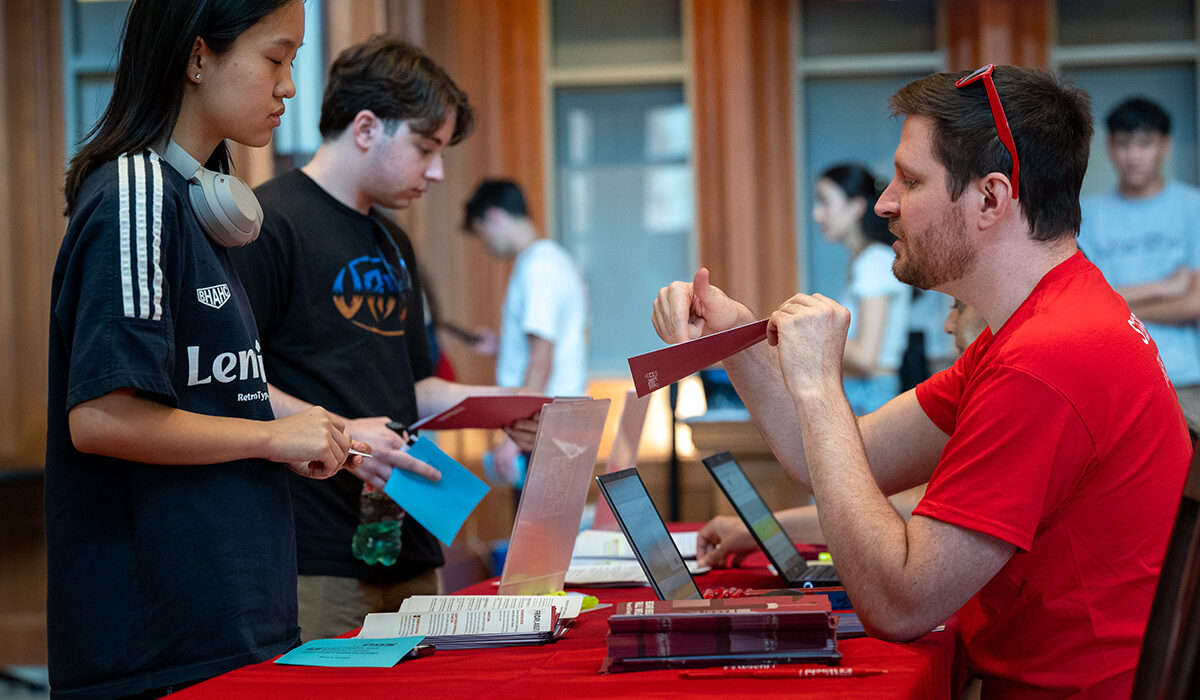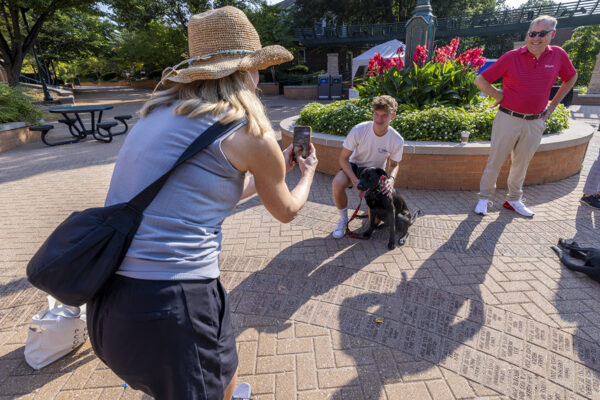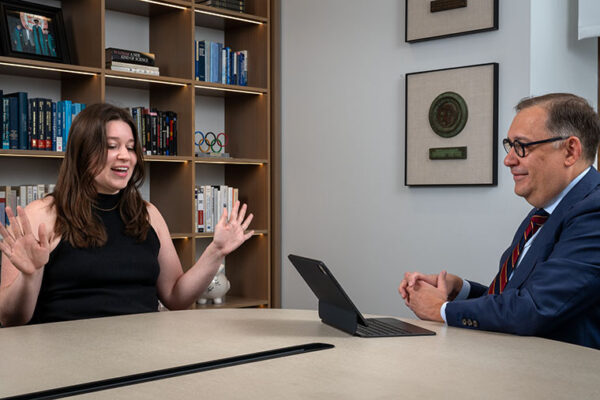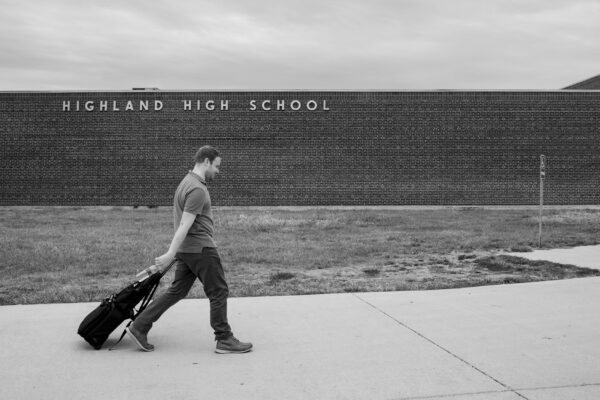In its first class since the U.S. Supreme Court banned race-conscious admissions, Washington University in St. Louis reports the percentage of first-year students who are from rural communities, low income or the first in their families to attend college has slightly increased. However, WashU saw a 4 percentage-point drop in first-year students who identify as Black/African American, while the percentage of Asian, white and Hispanic students stayed relatively steady. The percentage of students who did not disclose their race went up by 4 points. Overall 47% of the entering class identifies as a student of color compared with 53% last year.
Ronné Turner, vice provost for admissions and financial aid, said the Class of 2028 is talented and diverse. In total, WashU’s incoming class has 1,851 students. The university admitted about 12% of its 32,753 applicants. Students hail from 49 states and 32 countries. The percentage of students receiving financial aid awards increased from 42% to 48%; the average aid package is nearly $72,000, an increase of almost $6,000.
“It’s a great class,” Turner said. “The students who enrolled are accomplished, interesting and will bring diverse experiences, perspectives and backgrounds to our community. And I’m really excited that our new financial aid initiatives, such as the no-loan program, have allowed us to enroll more students who are receiving financial aid — that’s huge. As our team turns our attention to recruiting next year’s class, we will continue to work hard to meet institutional goals and enroll students who we know will thrive here and will be good university citizens.”
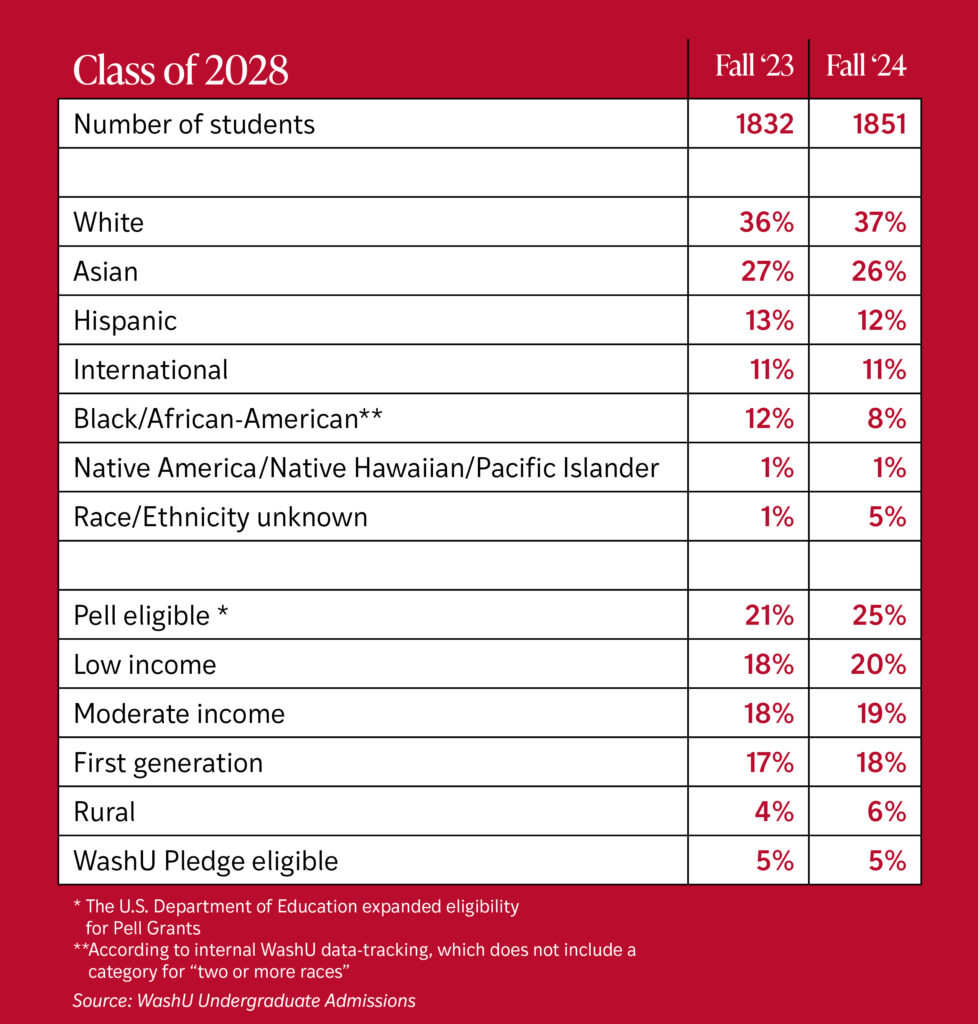
Below, Turner discusses how Undergraduate Admissions selected the Class of 2028 and new strategies to further promote racial and economic diversity. She also addresses the ongoing federal student aid crisis and the future of test-optional admissions.
How did the Supreme Court decision change your admissions process?
To ensure compliance with the SCOTUS decision, information about an applicant’s race was removed from applications, so during the application evaluation and selection process, the admissions committee did not have that information. In fact, we did not look at racial data until after the class had enrolled and we had released the waitlist.
In the SCOTUS opinion, the chief justice did state that if a student chooses to write about their racial identity in their essays, we could consider that as contextual information — not that they identify as Latinx, for instance, but how their identity shaped their experiences, character, aspirations or opportunities. Like many institutions, we added an optional opportunity for students to tell us more about themselves. And a good percentage of students did choose to give us some additional information about who they are and what motivates them.
Some observers may think the drop in admitted Black students proves the plaintiffs’ point.
The students we admit to WashU are all well qualified regardless of whether we know their race or not. That absolutely has always been the case, long before the SCOTUS decision. One of the things admissions professionals haven’t done well, and that the court case did not do well, is explain that there’s never one factor that gets a student admitted. As a highly selective school that practices holistic review, we are trying to shape a class. So, we look at all aspects of a student’s application, including their grades, coursework, preparation for WashU, achievements, experiences and opportunities. And we select a class that we believe will be successful and contribute positively to our community. We also work to meet institutional priorities in our selection process. For instance, we have a rural initiative, so we are working hard to recruit and enroll the best students from rural and small-town communities.
We also believe fundamentally that a diverse student body makes us better. While we were able to consider lots of other factors about an applicant’s background, we were not able to consider an applicant’s racial identity in the admission decision.
Will you change the admissions process next year?
From a recruitment standpoint, the university has supported us to add more staff, including regional positions in Atlanta and Texas and an additional person focused on St. Louis. I’m not saying we weren’t already visiting these places — we absolutely were. But with a few more staff members, we can now spend more time in regions targeting schools and community-based organizations that can help us continue to build a diverse, well-qualified applicant pool. In terms of the application, we have refined and strengthened the optional essay questions, which we hope will encourage more students to share more about their experiences.
How much of this challenge is about recruitment and how much is a reflection of the gaping disparities in K-12 education?
We know there are disparities in K-12 education and these disparities absolutely impact opportunities for students who are interested in going to college. However, there are some things that WashU and other institutions can do to expand the pool of students who are prepared for college. My team and I are working to do early outreach so talented students who haven’t had a lot of exposure to college or highly selective colleges and universities understand the things they need to do to prepare. There are talented students out there who want to be engineers, for instance, but their high schools might not offer physics or calculus, or they don’t know these classes are needed for admission to highly selective engineering programs like WashU. And that’s a challenge for us and schools like WashU.
We also work closely with WashU’s College Prep Program, which supports talented, limited-income St. Louis high school students over the course of three years and exposes them to foundational coursework they need to succeed whether they want to attend WashU or another institution. Another example is our Rural Scholars Academy, which helps students better understand the holistic review process.
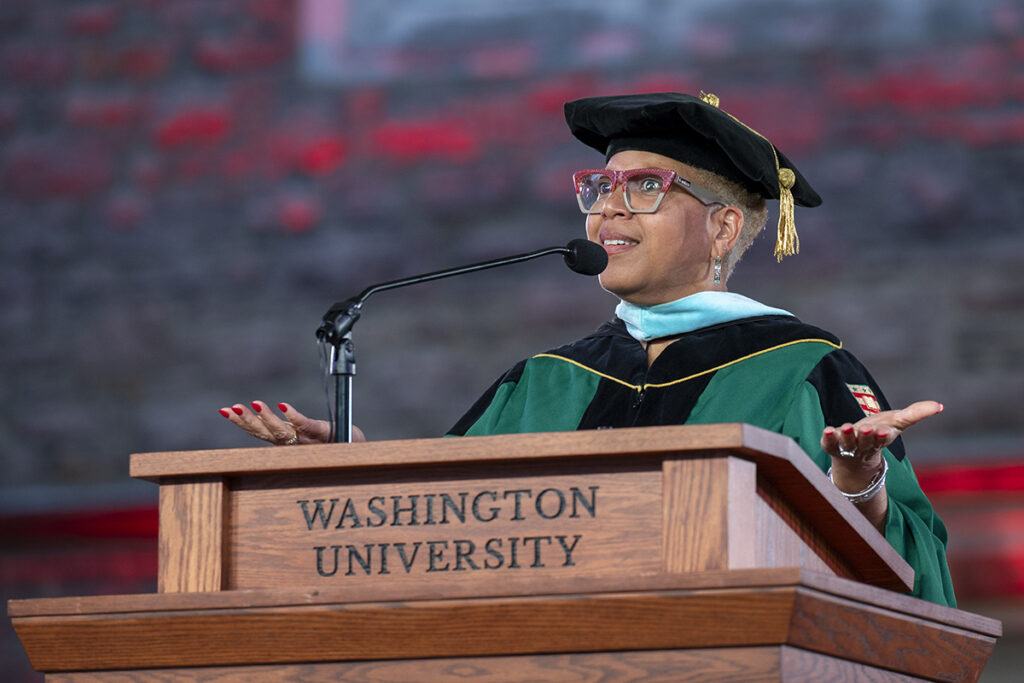
Are there successes you are especially proud of this year?
Absolutely. Again, we are really excited about the great students who have enrolled. We are proud to have increased the percentage of students from rural communities from 4% to 6%. That’s in large part due to our Heartland Initiative and being part of the STARS College Network (a coalition of 32 top schools that support rural students and counselors). We also were part of a QuestBridge pilot, offering direct admission to QuestBridge students who did not match to their first-choice institutions. (QuestBridge connects high-achieving, low-income seniors to full four-year scholarships at top schools. Like the medical residency, students and schools are paired based on their preferences. Some highly qualified students don’t “match.”) All in all, we had 100 QuestBridge students match with us and another dozen or so decide to come here through direct admissions. We’re excited because QuestBridge has really great students.
How did the FAFSA chaos impact WashU?
We use the CSS Profile, which provides a much more detailed financial picture, but we confirm that data with the FAFSA (Free Application for Federal Student Aid) data. And this year there were discrepancies. So, we delayed releasing our financial awards for regular-decision applicants by about a week because we needed to understand what the differences were.
Unfortunately, we also had to delay our current student aid awards. We typically have an early process where students receive their financial aid awards for the upcoming year around February. It has been a challenging year, and I’m afraid we will see some of the same problems next year. We just found out that the FAFSA, which is supposed to open in October, will be delayed until December. And there are some who are very skeptical of that timeline. At WashU, we will continue to require the CSS Profile for new and returning students and we anticipate using the profile data to release financial aid awards in a more timely way.
The best advice we can give to high school seniors — and current WashU students — is to pay attention to the communications you are receiving from financial aid offices. We will do our best to keep you updated on the timeline. It’s important for you to be ready to do that FAFSA as soon as it opens. And be patient.
WashU is test-optional for the Class of 2029. Do you expect that to change?
We will make a recommendation to the provost based on data. I don’t know what that will be. We know that standardized test scores do a good job of predicting first-year success in higher education in conjunction with high school GPA. What we don’t know yet, as an institution, is how students who don’t submit test scores perform. That’s the question we are studying right now, and we need to do more research before we make a recommendation to university leadership. It is a complex question given a number of factors, including learning loss that students may have experienced during COVID.
But there are other considerations. In-school testing is no longer being offered in many public high schools in California since the UCs no longer require test scores for admission. Also, fewer public high schools are willing to use instructional time to give college admission tests in school. There are reports that some other regions of the country don’t have enough testing sites to accommodate students who want to sit for tests. There is a lot we need to consider in making a recommendation about our testing policy.
It all sounds pretty overwhelming for your team.
The work our team does is challenging, but we know how important access to higher education is, and we know that WashU offers undergraduates outstanding opportunities. We feel fortunate to represent WashU and to interact with talented students from around the world. However, the application and decision process can be tough. As our team is reading the application files of incredible students, one of the things we always keep in mind is that there are real students behind these applications, students who have trusted us with a lot a personal information. We can get really attached to an applicant, but then have to make hard admission decisions in committee.
Remember, about 80% of the applicant pool is well qualified to be here, but we can’t admit everyone. Honestly, it can get pretty emotional. But it’s also rewarding. Seeing the Class of 2028 as they have moved in, gone through Bear Beginnings and celebrated Convocation has been fun and exciting.
